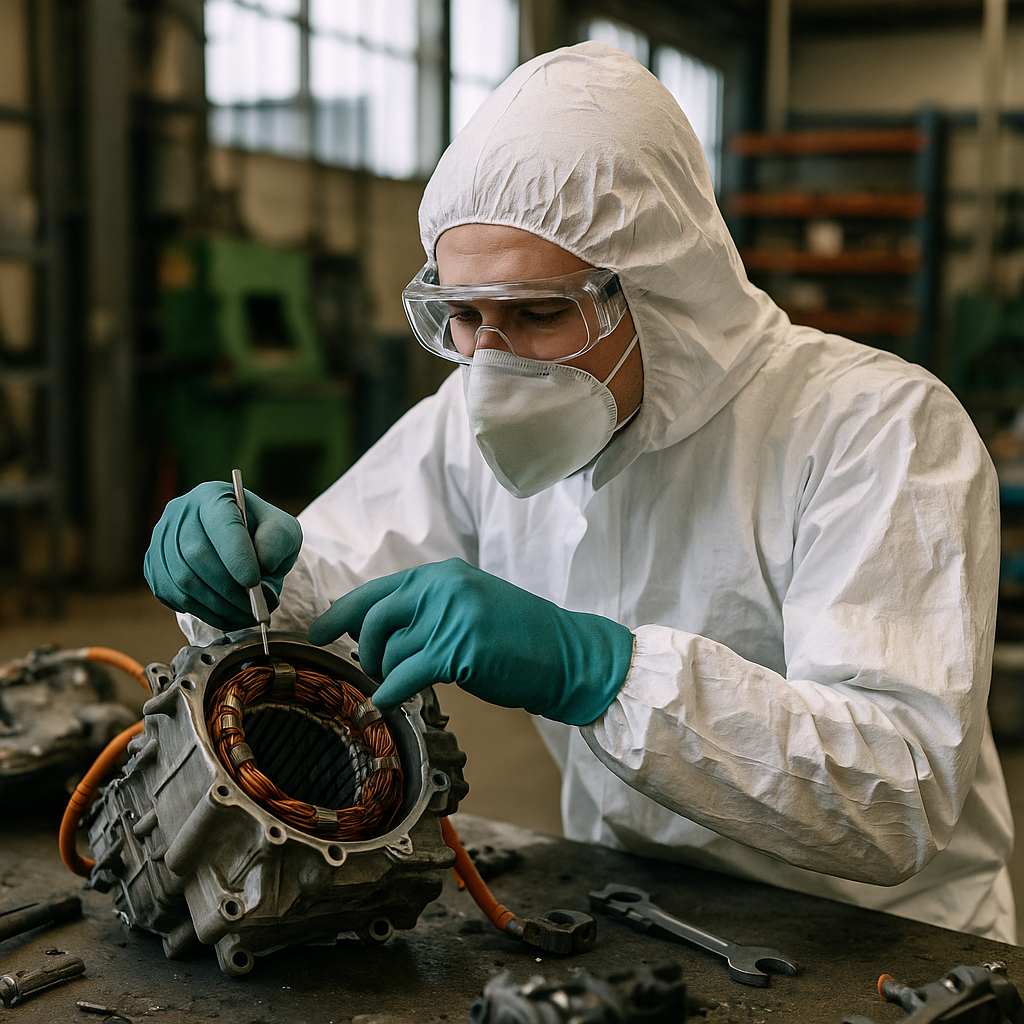5901 Botham Jean Blvd, Dallas, TX 75215
Learn the Specialized Options For Electric Motor Recycling in Houston
November 12, 2025Houston leads the nation in electric motor recycling innovation, with specialized facilities achieving impressive 99.8% efficiency rates in rare earth element recovery from EV motor magnets. This breakthrough technology transforms electronic waste into valuable resources worth thousands of dollars per ton.
The environmental benefits go beyond profit margins. Electric motor recycling in Houston annually diverts thousands of tons from landfill waste while conserving critical natural resources like copper, steel, and aluminum. These sustainable processes require 95% less energy compared to mining virgin materials, significantly reducing the region’s carbon footprint. Industrial services including ISS and CMC process high-horsepower motors alongside general scrap metal, creating a comprehensive recycling ecosystem serving both residential and commercial sectors.
Houston’s recycling infrastructure generates substantial economic impact through job creation and materials recovery. The city’s strategic location and specialized facilities attract electronic waste from across the region, establishing Houston as a hub for sustainable resource management. This positions local businesses and municipalities to capitalize on the growing demand for recycled materials while meeting environmental sustainability goals that drive modern industrial operations.
What Specialized Options Exist for EV Motor Recycling?

Electric vehicle motor recycling has evolved beyond traditional scrap processing. Specialized companies now offer targeted services to recover valuable rare earth elements with remarkable efficiency. These operations specifically address the complex magnets found in EV drivetrains.
Most conventional recycling facilities cannot effectively process EV motors. The powerful magnets contain neodymium, praseodymium, and dysprosium, requiring specialized handling. Standard shredding processes often result in these valuable materials being lost to steel slag or mixed waste streams.
Advanced Recovery Technologies
Several companies have developed proprietary processes for recovering EV motor magnets.
Direct recycling methods preserve the original magnet structure by demagnetization and mechanical milling, creating reusable powder. This retains magnetic properties and requires less energy than producing new magnets from raw materials.
Hydrometallurgical Processing
Some specialized recyclers use chemical dissolution techniques. These involve controlled acid treatments to selectively extract rare earth elements, allowing for the separation of individual elements like neodymium and dysprosium from motor assemblies.
Hydrometallurgical methods manage larger volumes of mixed motor waste. The chemical processes separate rare earths from steel, copper, and aluminum components, creating multiple revenue streams from a single motor unit.
Benefits of Specialized EV Motor Recycling
Specialized recyclers offer distinct advantages over conventional scrap processors:
- Higher recovery rates for valuable rare earth elements
- Proper handling of magnetized components with safety protocols
- Certified destruction services for proprietary motor designs
- Documentation supporting ESG reporting requirements
- Revenue generation from electronic waste streams
These services help automotive manufacturers meet sustainability targets. The recovered materials support circular economy initiatives by reducing dependence on newly mined rare earths. Companies can demonstrate environmental responsibility through verified recycling processes.
Specialized processors also provide supply chain transparency through tracking systems that document material flows from collection through final processing. This visibility supports compliance with environmental regulations and corporate sustainability commitments.
How is the Value of a Recycled Electric Motor Determined?
Weight is the primary factor in determining the value of an electric motor. Recycling facilities price motors by the pound, with the total weight directly affecting the final payout. Most electric motors are about 90% steel by weight, so steel market rates largely drive their overall value, despite copper being the more valuable component.
Material composition determines core value. Copper windings are the highest-value component in any motor, while the steel housing and rotor add to the bulk weight. Fractional electric motors typically contain 9-10% copper by weight, AC motors average 7-9%, and DC motors contain 15-18%. These percentages directly impact each unit’s revenue potential.
Motor Size and Type Impact Pricing
Smaller motors generally command higher per-pound prices due to their better copper-to-steel ratios. Large industrial motors may contain more total copper, but they have lower copper percentages relative to their overall weight. A 50-pound industrial motor with 10 pounds of copper might generate $25-35 from the copper content alone, plus an additional $4-10 from steel components at current market rates.
Motor type significantly impacts valuation. Servo motors and industrial units typically have heavier copper coils, securing premium rates from specialized recyclers. Consumer appliance motors from washing machines, dryers, and household fans generally fall into lower value categories because newer models after 2010 often use aluminum windings.
Market Rate Variables and Pricing Fluctuations
Current commodity prices for nonferrous and ferrous metals cause daily valuation changes. Copper prices typically range from $2.50 to $3.50 per pound, while mixed steel trades between $0.10 and $0.20 per pound, according to current market data. These rates fluctuate based on global supply and demand conditions.
Regional pricing variations significantly affect final payouts. Local scrap yards set their own rates based on transportation costs, processing capabilities, and regional market conditions. Recycling facilities in areas with higher copper demand may offer premium prices compared to locations with limited processing infrastructure.
Preparation and cleanliness influence final valuations. Motors stripped of plastic components, rubber mounts, and excess steel attachments receive higher per-pound rates. Facilities may apply price deductions for contaminated or poorly prepared materials, reducing the overall revenue from recycling operations.
Conclusion: Finding the Right Recycling Service in Houston
Houston’s recycling landscape offers comprehensive solutions for all types of electronic and industrial waste. Businesses can dispose of EV motors through specialized processors like CompuCycle, handle large-scale industrial scrap with established companies or manage residential electronics via certified recyclers. The city provides certified, environmentally compliant options to ensure proper handling of valuable materials while meeting strict data destruction and environmental standards.
The environmental benefits and potential revenue generation make recycling crucial for Houston’s businesses and residents. Professional recycling services help organizations meet sustainability goals, protect sensitive data, and recover valuable materials. For comprehensive recycling solutions tailored to your specific needs, contact Okon Recycling at 214-717-4083.
